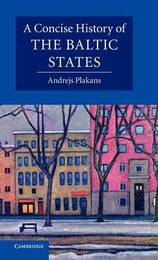
|
A Concise History of the Baltic States
Hardback
Main Details
| Title |
A Concise History of the Baltic States
|
| Authors and Contributors |
By (author) Andrejs Plakans
|
| Series | Cambridge Concise Histories |
|---|
| Physical Properties |
| Format:Hardback | | Pages:492 | | Dimensions(mm): Height 222,Width 145 |
|
| ISBN/Barcode |
9780521833721
|
| Classifications | Dewey:947.9 |
|---|
| Audience | | General | | Tertiary Education (US: College) | |
|---|
| Illustrations |
1 Maps; 45 Halftones, unspecified
|
|
Publishing Details |
| Publisher |
Cambridge University Press
|
| Imprint |
Cambridge University Press
|
| Publication Date |
24 February 2011 |
| Publication Country |
United Kingdom
|
Description
The Baltic region is frequently neglected in broader histories of Europe and its international significance can be obscured by separate treatments of the various Baltic states. With this wide-ranging survey, Andrejs Plakans presents an integrated history of three Baltic peoples - Estonians, Latvians and Lithuanians - and draws out the common threads to show how it has been shaped by their location in a strategically desirable corner of Europe. Subordinated in turn by Baltic German landholders, the Polish nobility and gentry, and then by Russian and Soviet administrators, the three nations have nevertheless kept their distinctive identities - significantly retaining three separate languages in an ethnically diverse region. The book traces the countries' evolution from their ninth-century tribal beginnings to their present status as three thriving and separate nation states, focusing particularly on the region's complex twentieth-century history, which culminated in the eventual re-establishment of national sovereignty after 1991.
Author Biography
Andrejs Plakans is Professor Emeritus at the Department of History, Iowa State University. His previous publications include The Latvians: A Short History (1995) and the Historical Dictionary of Latvia, 2nd edition (2008).
Reviews'A masterful survey of the history of the eastern Baltic littoral by one of the leading authorities in the field. Plakans' book provides the most accessible account to date of the rise of modern nationhood and of the commonalities of fate that have bound the peoples of the region during the modern era. Essential reading for anyone interested in understanding contemporary Estonia, Latvia and Lithuania.' David J. Smith, University of Glasgow 'A tour de force of concise and yet comprehensive history - probably the most complete and nuanced in any language. Plakans traces the footsteps of hunter-gatherers and farmers moving north with retreating glaciers to the struggles of contemporary Estonians, Latvians, and Lithuanians as they labor to maintain their national identities amid globalized interdependence. He discerns no simple patterns and notes the distinct trajectories of each people. The author underscores what is not known, particularly about earlier times, but weaves abundant factual information into the narrative.' Walter C. Clemens, Jr, Boston University
|